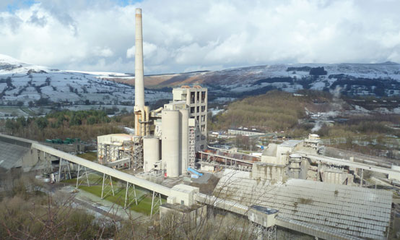Hope Cement Kiln: Difference between revisions
No edit summary |
|||
| (3 intermediate revisions by 2 users not shown) | |||
| Line 1: | Line 1: | ||
[[Hope Cement Kiln]] is located in Derbyshire and is owned by [[Breedon Cement]]. | |||
{{CementKiln|EPR=BP3731VJ|id=5}} | {{CementKiln|EPR=BP3731VJ|id=5}} | ||
[[Category:Cement Kilns]] | [[Category:Cement Kilns]] | ||
| Line 18: | Line 19: | ||
==Raw Materials== | ==Raw Materials== | ||
The primary raw materials are Carboniferous Limestone and Boulder Clay and Carboniferous Shale. | The primary raw materials are Carboniferous Limestone and Boulder Clay and Carboniferous Shale. | ||
{{NHLFTable|Permit=BP3731VJ}} | |||
{{EAIn|EPR=BP3731VJ|CK=T}} | |||
{{ | |||
Around 40% of the tonnage listed was used for the primary purpose of substituting fuel requirements in the plant, with coal fly ash (also called Pulverized Fuel Ash or [[PFA]]) used as a replacement for raw material (shale) in the production process<ref>[https://www.hopecementworks.co.uk/about/ Breedon/Hope Cement Website - About]</ref>. | Around 40% of the tonnage listed was used for the primary purpose of substituting fuel requirements in the plant, with coal fly ash (also called Pulverized Fuel Ash or [[PFA]]) used as a replacement for raw material (shale) in the production process<ref>[https://www.hopecementworks.co.uk/about/ Breedon/Hope Cement Website - About]</ref>. | ||
==References== | ==References== | ||
<references /> | <references /> | ||
Latest revision as of 09:50, 10 November 2022
Hope Cement Kiln is located in Derbyshire and is owned by Breedon Cement.
| Hope Cement Kiln | |
 See Cement Kilns → page for a larger UK Wide map. | |
| Waste Licence | BP3731VJ |
| Operator | Breedon Cement |
| Parent Company | Breedon Group |
| Clinker Capacity | 1.3 Mt |
Summary site information collated from a variety of sources.

Overview
WikiWaste has used the website Cement Plants and Kilns in Britain and Ireland[1] extensively for the reference material for each individual cement kiln page. The detail on this reference website is extensive and as WikiWaste is focused upon the UK waste and resource market, only the key highlights are captured from this website (and company websites accordingly) to provide background and context. Hope started manufacturing clinker in 1929 and up to 2015 had produced 68 million tonnes of clinker through 7 rotary kilns over this period.
Ownership
- 1929 to 2001 BPCM (G&T Earle)(Blue Circle)
- 2001 to 2013 Lafarge
- 2013 to 2017 Hope Construction Materials
- 2017 to Present Breedon Cement (part of the Breedon Group)
The Process at Hope
The process at the site is similar to that at Cookstown - a 'semi-dry process' from kiln supplier Polysius (part of the ThyssenKrupp group).
Raw Materials
The primary raw materials are Carboniferous Limestone and Boulder Clay and Carboniferous Shale.
Waste Tonnage, EWC List
The table shows a list of the Waste for the Permit BP3731VJ, that has arrived into sites as reported to the Regulator and then publicised in their reported statistics. The Data was last updated in Oct-24. The total reported tonnage arriving at the site was: 98,171.27t.
| EWC Code | Description | Tonnes In |
|---|---|---|
| 10 01 02 | coal fly ash | 66422 |
| 10 01 03 | fly ash from peat and untreated wood | 66.07 |
| 10 01 05 | calcium-based reaction wastes from flue gas desulphurisation in solidform | 55.98 |
| 16 01 03 | end-of-life tyres | 14684.48 |
| 19 12 10 | combustible waste (refuse derived fuel) | 16942.74 |
Waste Tonnage, By Origin
The table shows a list of the Waste for the Permit BP3731VJ, that has arrived into sites as reported to the Regulator and then publicised in their reported statistics. The Data was last updated on Oct-24. The total reported tonnage arriving at the site was: 98,171.27t.
Where this tonnage exceeds that reported in year of the corresponding annual report, this may be due to the following reasons:
- Tonnage may have been received but not incinerated, i.e. the material is held pending incineration (the operator return to the EA reports as received whereas the annual report focuses on when the waste is incinerated.)
- Material may have been received into the site but treated in some other way than incineration.
- Material may have been received on the but transferred out of site for disposal/treatment at another site rather than incineration on the site.
| EWC Code | Origin of Waste | Tonnes In |
|---|---|---|
| 10 01 02 | Nottinghamshire | 66422 |
| 10 01 03 | North Yorkshire | 66.07 |
| 10 01 05 | Yorks & Humber | 55.98 |
| 16 01 03 | East Riding of Yorkshire | 14684.48 |
| 19 12 10 | Lancashire | 16942.74 |
Around 40% of the tonnage listed was used for the primary purpose of substituting fuel requirements in the plant, with coal fly ash (also called Pulverized Fuel Ash or PFA) used as a replacement for raw material (shale) in the production process[2].
